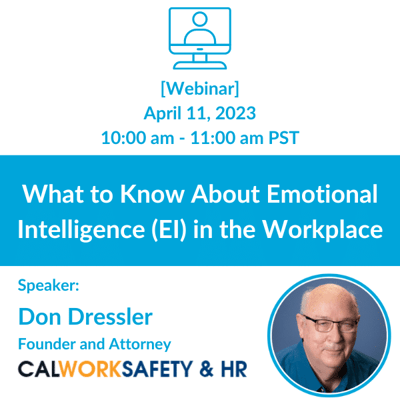10 Signs of Low Emotional Intelligence (EI) in the Workplace
April 6th, 2023 | 5 min. read

The World Economic Forum Future of Jobs Report tracks changes to employment and projects an expected outlook for the future of job-related skills, especially with regard to advancements in technology. Given this, you would expect that the top 10 most desirable workplace skills would all pertain to technology.
This, however, is not the case.
Even in a technology-driven world, Emotional Intelligence (EI) ranks high among the top 10 skills that employers look for and will continue to look for in the future.
Why? Because studies show that EI has a 58% influence on job performance and 90% of top performers across all job types have high EI.
These statistics leave you to wonder – How does EI factor into performance in your workplace?
Here at Combined, our HR team recognizes the importance of EI in the workplace and can help you use EI as a tool to enhance the communication, engagement, and performance of your employees. To do this though, you first need insight into the level of EI expressed in your workplace.
In this article, we will discuss how to evaluate workplace EI so you can isolate areas to improve upon it. By reading it, you will learn 10 signs of low Emotional Intelligence (EI) in the workplace.
What is Emotional Intelligence (EI)?
To put it simply, Emotional Intelligence (EI) is the ability to:
- Harness your understanding of emotions
- Apply this understanding to engage effectively with others
- Use adaptive interactions to build, balance, and maintain better relationships
It requires the application of self-awareness, self-management, social awareness, and relationship management skills to better regulate communication, behavior, and interactions.
To learn more about what EI is and why it matters to your business, read The Value of Emotional Intelligence (EI) in the Workplace.
How to measure Emotional Intelligence (EI)
Emotional Intelligence (EI) is measured by proficiency in the four soft skills mentioned above:
- Self-awareness: The ability to understand your emotions and natural responses to them
- Self-management: The ability to control your emotions and regulate your responses to them
- Social awareness: The ability to understand others’ emotions and how they react to them
- Relationship management: The ability to use this understanding of others to interact effectively
Each of these skills is interrelated and all factor into the overall measure of EI – Having high EI means having a mastery of all four skills.
To effectively measure the extent of EI in your workplace, you have to intuitively observe these four skills in action – Keep reading to learn how.
1. Lacking empathy in interactions
Perhaps the largest tell-tale of low Emotional Intelligence (EI), is the inability to understand and relate to others’ emotions, perspectives, and experiences.
In the workplace, an environment where success relies on the collective efforts of many different people, this lack of empathy can be perceived as self-centered apathy. Often, this characteristic makes those with low EI exceptionally difficult to work with.
2. Arguing frequently
On average, you have 27 conversations each day of at least 10 minutes in length. Emotional Intelligence (EI) determines how constructively these 4.5 daily hours are spent.
If low EI factors into a conversation, studies show that arguing is a common side effect. Because EI involves understanding emotions, those with low EI tend to unnecessarily press issues until an amicable exchange becomes inflamed. Once it does, constructive communication quickly turns into senseless squabble. With this in mind, consider how much time is lost to frequent arguing when low workplace EI is at play.
3. Dismissing others’ viewpoints
Generally, the workplace is a collaborative environment.
By definition, collaboration means working together and accommodating different perspectives and ideas to achieve a common goal. Those with low Emotional Intelligence (EI) have an unrelenting need to always be right and are dismissive of any viewpoints that do not agree with their own.
In the workplace, low EI expression makes cooperation difficult and, as a result, impedes the achievement of common goals. In fact, 86% of employees attribute a lack of collaboration to workplace failures. Because low EI is adverse to effective collaboration, it has a negative impact on the work environment.
4. Disregarding others’ feelings
Another sign of low Emotional Intelligence (EI) is not caring, nor understanding the importance of caring, about how others feel. Those with low EI prioritize their feelings over all else.
Because the decisions you make are strongly linked to what you feel, those with low EI act in ways that only reflect their own best interest. And, in the workplace, this indifference toward others’ feelings leads to conflict.
5. Ignoring the effects of actions
The concept of “cause and effect” is widely understood to mean that for every action there is a response.
A simple example: If you wave at someone you know, they will likely wave back.
Those with low Emotional Intelligence (EI) do not recognize “cause and effect” when their actions cause an effecting response – even if their actions toward another person are insensitive, they will fault the other person for having a negative response.
This reactive relationship applies to workplace interactions. High EI in the workplace corresponds to positive “cause and effect” interactions between coworkers. However, interactions between coworkers with low EI result in workplace misunderstandings.
6. Denying personal responsibility
Low Emotional Intelligence (EI) is associated with playing “the blame game” rather than taking accountability.
This means that if something goes wrong in a workplace situation, a person with low EI will be the first to defensively point their finger at everyone else involved.
7. Failing to maintain relationships
A person’s social skills can indicate their degree of Emotional Intelligence (EI) – Those with low EI often have difficulty developing and maintaining relationships.
According to the U.S. Department of Labor, in 2021 68% of employed Americans spent at least a portion of their workweek in the workplace. This means that the large majority of employed people need to develop workplace relations. Low EI can prevent employees from forming these necessary workplace relationships, making the work environment not only tense but also less productive.
8. Avoiding sensitive situations
A person with low Emotional Intelligence (EI) not only disregards others’ feelings but also doesn’t understand them.
Recall that those with low EI prioritize their feelings over all else – So, in a sensitive situation where another person’s feelings are on the line, rather than try to understand and assist, they will likely remove themselves from it altogether. This behavior, again, prevents those with low EI from forming healthy workplace relationships.
9. Repressing emotions
Expressing emotions constructively is characteristic of high Emotional Intelligence (EI). Conversely, bottling up emotions until they come out in an unhealthy manner is linked to low EI.
In the workplace, repressing emotions can cause what could have been a gentle conversation to escalate into a much larger conflict.
10. Having emotional outbursts
It is common for those with low Emotional Intelligence to have trouble not only recognizing but also regulating their own emotions.
In the workplace, uncontrollable emotional outbursts, are not only distracting but can make the work environment uncomfortable.
How high is Emotional Intelligence (EI) in your workplace?
I repeat – If improving Emotional Intelligence (EI) could fix problems you are experiencing in the workplace, first identifying areas of low EI expression is the natural place to start when looking for a solution.
Which of these signs of low EI do you recognize in your workplace?
Could your workplace benefit from turning arguing into agreement? From concentration on consideration over disregard? From an emphasis on healthy emotional expression?
With an intentional focus on practices to teach and train high EI expression, you can start to eliminate these workplace worries. Read 5 Techniques to Improve Emotional Intelligence (EI) in the Workplace for more information on these proven practices.
Take the next steps to improve Emotional Intelligence (EI) in your workplace
If you are here, you’ve already taken steps toward improving the Emotional Intelligence (EI) in your workplace.
By reading this article, you are able to identify areas of low workplace EI expression and can take steps to address them.
Are you ready to improve your workplace with enhanced EI? Our HR experts, here at Combined, have the resources you need to do just that.

|
Want more information about Emotional Intelligence in the Workplace? Join the webinar to learn more. |
 |
If you are not yet ready to speak with a team member, you may find these resources helpful: |
This article is not intended to be exhaustive nor should any discussion or opinions be construed as legal advice. Readers should contact legal counsel for legal advice.
Topics:
